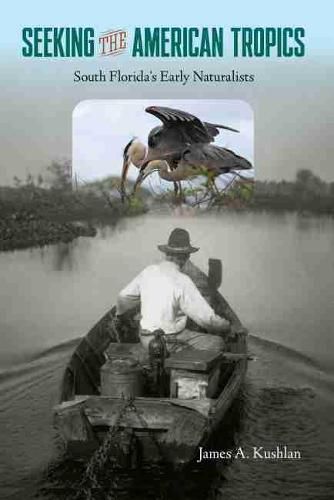Readings Newsletter
Become a Readings Member to make your shopping experience even easier.
Sign in or sign up for free!
You’re not far away from qualifying for FREE standard shipping within Australia
You’ve qualified for FREE standard shipping within Australia
The cart is loading…






This title is printed to order. This book may have been self-published. If so, we cannot guarantee the quality of the content. In the main most books will have gone through the editing process however some may not. We therefore suggest that you be aware of this before ordering this book. If in doubt check either the author or publisher’s details as we are unable to accept any returns unless they are faulty. Please contact us if you have any questions.
For centuries, the southernmost region of the Florida peninsula was seen by outsiders as wild and inaccessible, one of the last frontiers in the quest to understand and reveal the natural history of the continent. Seeking the American Tropics tells the stories of the explorers and adventurers who-for better and for worse-helped open the unique environment of South Florida to the world.Beginning with the arrival of Juan Ponce de Leon in 1513, James Kushlan describes how most of the famous Spanish explorers never made it to South Florida, leaving the area’s rich natural history out of scientific records for the next 250 years. It wasn’t until the British colonial and early American periods that the first surveyors were commissioned and the first naturalists-Titian Peale and John James Audubon-arrived to collect, draw, and report the subtropical flora and fauna that were so unique to North America. Moving into the railroad era, Kushlan illuminates the activities of scientists such as Henry Nehrling and Charles Torrey Simpson alongside the dabbling of wealthy amateur naturalists. He follows the story to the 1920s, when tourism was flourishing and signs of ecological damage were starting to show. Years of wildlife trade, resource extraction, invasive species introduction, and swamp drainage had taken their toll. And many of the naturalists who had been outspoken about protecting South Florida’s environment had also played a part in its destruction. Today the region is among one of the most thoroughly studied places on the planet-but at a cost. In this absorbing and cautionary tale, Kushlan illustrates how exploration has so often trumped conservation throughout history. He exposes how much of the natural world we have already lost in this vivid portrait of the Florida of yesterday.
$9.00 standard shipping within Australia
FREE standard shipping within Australia for orders over $100.00
Express & International shipping calculated at checkout
This title is printed to order. This book may have been self-published. If so, we cannot guarantee the quality of the content. In the main most books will have gone through the editing process however some may not. We therefore suggest that you be aware of this before ordering this book. If in doubt check either the author or publisher’s details as we are unable to accept any returns unless they are faulty. Please contact us if you have any questions.
For centuries, the southernmost region of the Florida peninsula was seen by outsiders as wild and inaccessible, one of the last frontiers in the quest to understand and reveal the natural history of the continent. Seeking the American Tropics tells the stories of the explorers and adventurers who-for better and for worse-helped open the unique environment of South Florida to the world.Beginning with the arrival of Juan Ponce de Leon in 1513, James Kushlan describes how most of the famous Spanish explorers never made it to South Florida, leaving the area’s rich natural history out of scientific records for the next 250 years. It wasn’t until the British colonial and early American periods that the first surveyors were commissioned and the first naturalists-Titian Peale and John James Audubon-arrived to collect, draw, and report the subtropical flora and fauna that were so unique to North America. Moving into the railroad era, Kushlan illuminates the activities of scientists such as Henry Nehrling and Charles Torrey Simpson alongside the dabbling of wealthy amateur naturalists. He follows the story to the 1920s, when tourism was flourishing and signs of ecological damage were starting to show. Years of wildlife trade, resource extraction, invasive species introduction, and swamp drainage had taken their toll. And many of the naturalists who had been outspoken about protecting South Florida’s environment had also played a part in its destruction. Today the region is among one of the most thoroughly studied places on the planet-but at a cost. In this absorbing and cautionary tale, Kushlan illustrates how exploration has so often trumped conservation throughout history. He exposes how much of the natural world we have already lost in this vivid portrait of the Florida of yesterday.